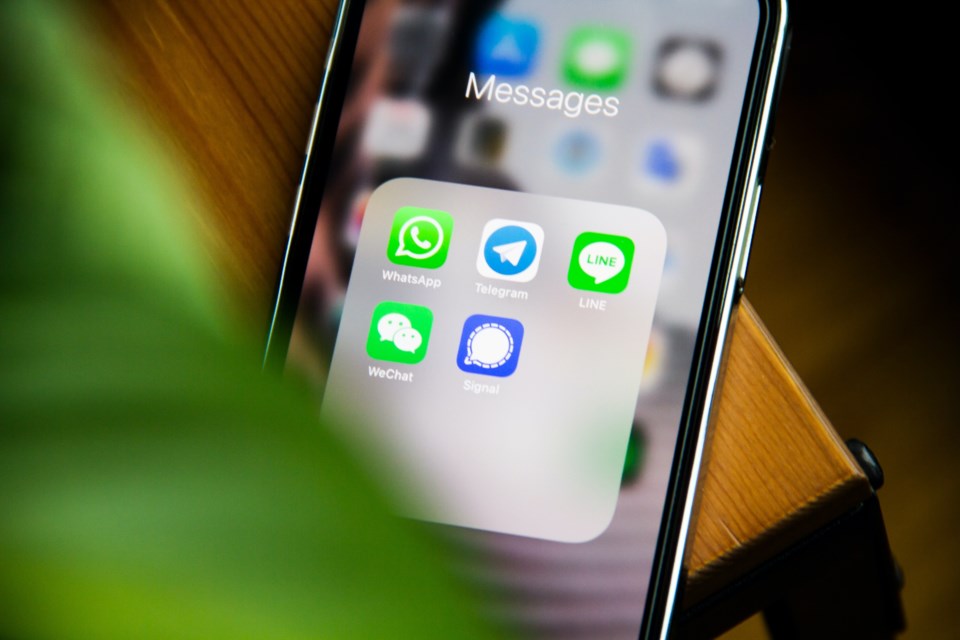Vancouver city hall has not decided whether to remove WeChat from its devices, like it did after the federal and sa国际传媒 governments banned TikTok from their devices earlier this year.
Citing privacy and security concerns, Treasury Board president Anita Anand gave the immediate order on Tuesday to remove the Chinese social media, messaging and payment app from federal devices and to ban any further downloads.
Products from Kaspersky Lab, the Russian anti-virus software company, were also banned.
"Following the Government of sa国际传媒’s decision to remove WeChat and Kaspersky from mobile devices issued to staff, the City of Vancouver is currently reviewing our technology acceptable use policy which governs city-issued devices,” said a statement provided by Phoenix Lam of the city’s communications department.
“At this time, we have not banned or removed WeChat and Kaspersky apps from City of Vancouver devices.”
The Communications Security Establishment’s 2023-2024 National Cyber Threat Assessment warned that WeChat “has been used to spread misinformation, disinformation and malinformation and propaganda specific to the Chinese diaspora.”
WeChat has figured in recent Global Affairs sa国际传媒 warnings about foreign interference and targeting of politicians.
After Anand’s predecessor, Mona Fortier, announced a ban on the TikTok video app on Feb. 27, it took more than two weeks for Vancouver city hall to follow.
Of the 2,700 devices in its fleet, city hall counted 132 iPhones that contained TikTok.
The city’s chief technology officer, Tadhg Healy, initially expressed reluctance, even after sa国际传媒 Citizens’ Services Minister Lisa Beare quickly followed the federal lead.
The decision to remove TikTok and block further downloads was announced on March 14.
The Ministry of Citizens’ Services said that Kaspersky is not on any sa国际传媒 government-managed devices and that WeChat has not been permitted on such devices for nearly four years.
“In early 2020, it was communicated by the office of the Chief Information Security Officer to all security leads across all government ministries that WeChat was not permitted on government-managed devices,” said a statement provided by public affairs officer Farah Tarannum.
“Those security leads then ensured the application was uninstalled and reported back when the application was uninstalled. The ministry continues to monitor applications for any potential cybersecurity risks that may be associated.”
Despite that, the ministry said it considers WeChat to be “an important tool to share information about government programs, services and information with people in their preferred language.”
The sa国际传媒 government’s WeChat account was originally registered for personal use by Bruce Ralston when he was minister of jobs, trade and technology in 2018, the same year that then-premier John Horgan led a trade mission to China.
Horgan announced a tourism promotion agreement with WeChat when he met with executives from its parent company, Tencent.
Ralston, the NDP government’s liaison to the sa国际传媒 diplomatic corps, transferred the account to the government in 2020 and it is managed by contractor Fan Rong Marketing Ltd.
One of sa国际传媒’s top professors on data mining and cybersecurity said the federal ban was overdue.
“We have been demanding the government to ban this app for a very long time,” said Benjamin Fung of McGill University’s School of Information Studies.
“It was five or six years ago the U.K. government gave the first official warning on this app. So it takes several years for the Canadian government to actually take some action.”
Fung said WeChat is prone to Chinese Communist Party censorship and propaganda.
The risk to users is threefold: privacy, security and trust. The app requests access to all files on a device, the camera and microphone, and nearby devices.
“No matter if it is within China or outside of China, it is clear that the Chinese government and the Tencent company are monitoring all the communications,” Fung said.
WeChat is relied upon by many in the Chinese diaspora to stay in touch with friends and relatives in China.
“There are not many other alternatives,” Fung said. He advised that those in need of WeChat use it on an older smartphone, without any other communication or email apps.
“That will be a trade-off for individuals if they want to improve their security and avoid being a target for foreign interference.”
In mid-August, the sa国际传媒 government announced it had opened an account on the Weibo platform to post messages in Chinese about public safety, emergency preparedness, cost of living, housing, education, health care and justice services.
Third-party contractor Catalyst Agents was hired for the job.



